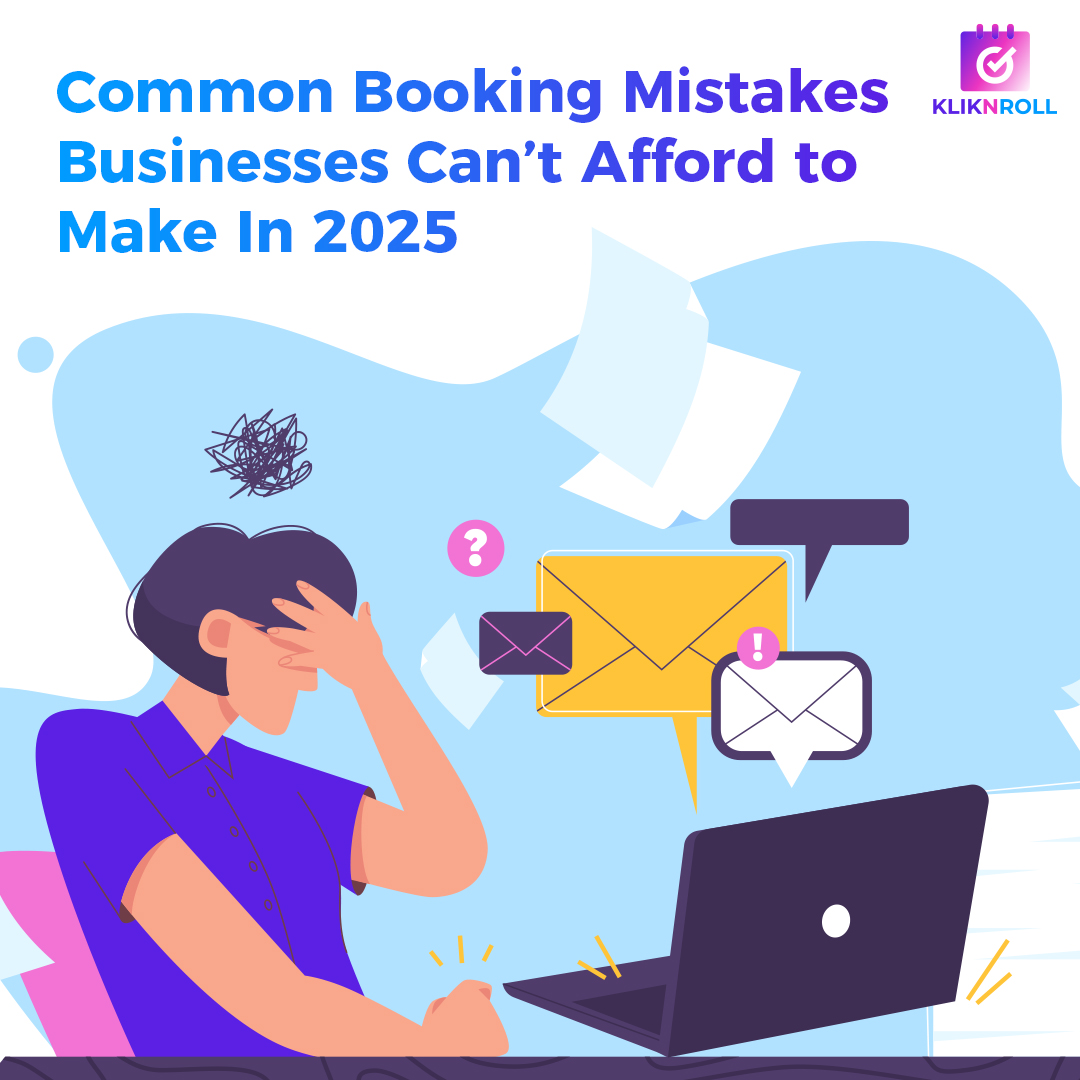Table of Contents
The way businesses handle bookings has evolved, and in 2025, the margin for error is even smaller.
Customers today expect fast, smooth, and mobile-friendly booking experiences. Whether it’s a haircut, a medical appointment, or a virtual consultation, they want to confirm their spot with a few taps and get instant feedback. Any friction along the way, double bookings, missing confirmations, clunky forms, feels outdated, and worse, unprofessional.
That’s why avoiding booking mistakes isn’t just about better operations. It’s about staying competitive, protecting revenue, and delivering the kind of customer experience people expect in 2025.
This article breaks down the most common booking mistakes businesses still make, and what you need to do now to fix them before they cost you your customers.
The good news? There’s a one-stop online booking system solution that can help you fix all these booking mistakes at the root. Keep reading to find out what they are, and how to solve them once and for all.
Thinking Booking is Just Admin, Not a Revenue Driver
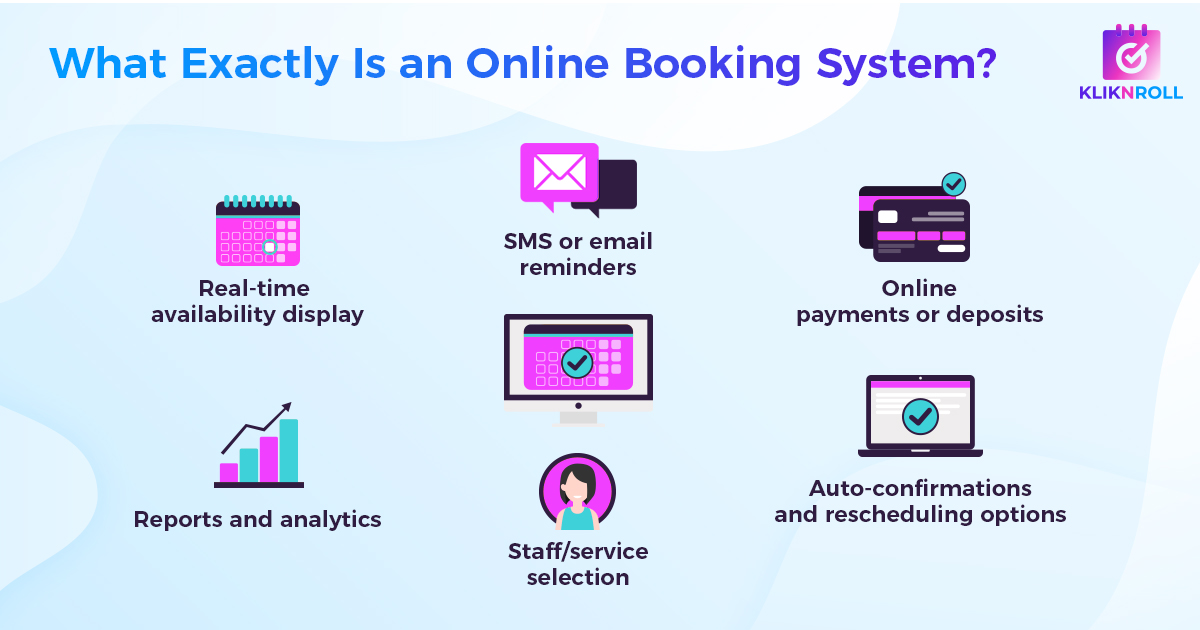
The first and perhaps most foundational booking mistake is underestimating the role of bookings in your overall business strategy. Many businesses treat bookings as clerical work, a task for receptionists or automated systems to handle passively.
But when a client books with you, it’s not just admin. It’s a conversion point, a lead turning into revenue.
Ignoring this means:
- You don’t track key metrics like booking-to-show rate or booking lead time.
- You miss revenue opportunities due to unfilled time slots.
- You let valuable customer engagement moments slip through the cracks.
Successful businesses understand that avoiding booking mistakes starts with seeing bookings as part of the sales funnel. They optimize the flow, monitor data, and treat it like a revenue-generating asset, not just a calendar entry.
Double Bookings Destroy Customer Trust
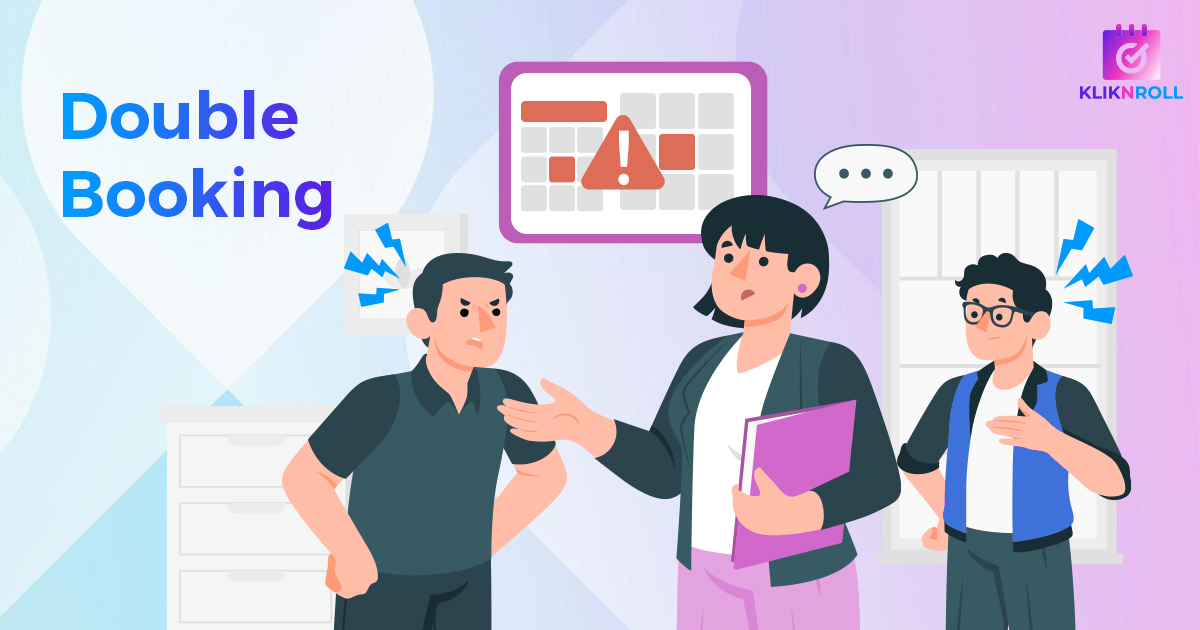
Of all the booking mistakes a business can make, double booking is one of the most damaging, not just operationally, but emotionally from the customer’s point of view.
Let’s say a customer, David, books a 3:00 PM consultation through your website. Another customer, Lisa, calls your office and is manually scheduled for the same slot. Your systems aren’t synced. On the day, both show up, and only one can be served.
To you, this may seem like an unfortunate overlap. But to the customer who made time in their day, possibly rearranged other appointments, arranged transportation, and mentally prepared for the session, it feels like they’ve been dismissed, or worse, disrespected.
This Is More Than an Operational Error, It’s a Trust Violation
Customers book appointments expecting order, not chaos. When you double book, it signals disorganization. Even if your service is excellent, the experience begins with frustration. And once trust is broken at the start, it’s difficult to repair, especially for service-based businesses where reliability is the foundation of long-term relationships.
This is particularly critical in industries like:
- Healthcare: Patients need privacy and punctuality.
- Personal care: Clients expect full attention during beauty or wellness sessions.
- Professional services: Consultants, coaches, or agents can’t afford delays without hurting their brand.
In these settings, time is not just time, it’s a reflection of professionalism. One double booking doesn’t just cost you an appointment; it could cost you repeat business, referrals, and public reputation.
Staff Pressure Builds When Systems Fail
Operationally, double bookings throw everything off balance:
- Staff members are forced to make snap decisions, who to serve first?
- They spend valuable time trying to reschedule or calm an angry client.
- Other customers’ appointments get delayed, creating a domino effect of dissatisfaction.
What starts as a single scheduling error quickly spirals into a disrupted day, stressed employees, and frustrated clients waiting longer than promised. Over time, these compounding moments wear down your team’s morale and your brand image.
How to Stop It, and Rebuild Confidence
Fixing this doesn’t just prevent mistakes, it builds trust.
- Centralize your booking system so that all staff and channels access the same live availability.
- Use booking software with automated conflict prevention, meaning it locks time slots once selected.
- Enable real-time updates across devices, especially for businesses with multiple locations or shared resources.
- Add buffer time between bookings to prevent unintentional overlaps, especially if some sessions tend to run longer.
Proactively preventing double bookings shows your clients that you respect their time, and in return, they’re more likely to respect your business, return for future sessions, and recommend you to others.
Because in the customer’s eyes, showing up for a booking on time and being told “we made a mistake” is not a small inconvenience, it’s a broken promise.
Not Sending Confirmations or Reminders, No-Shows Guaranteed
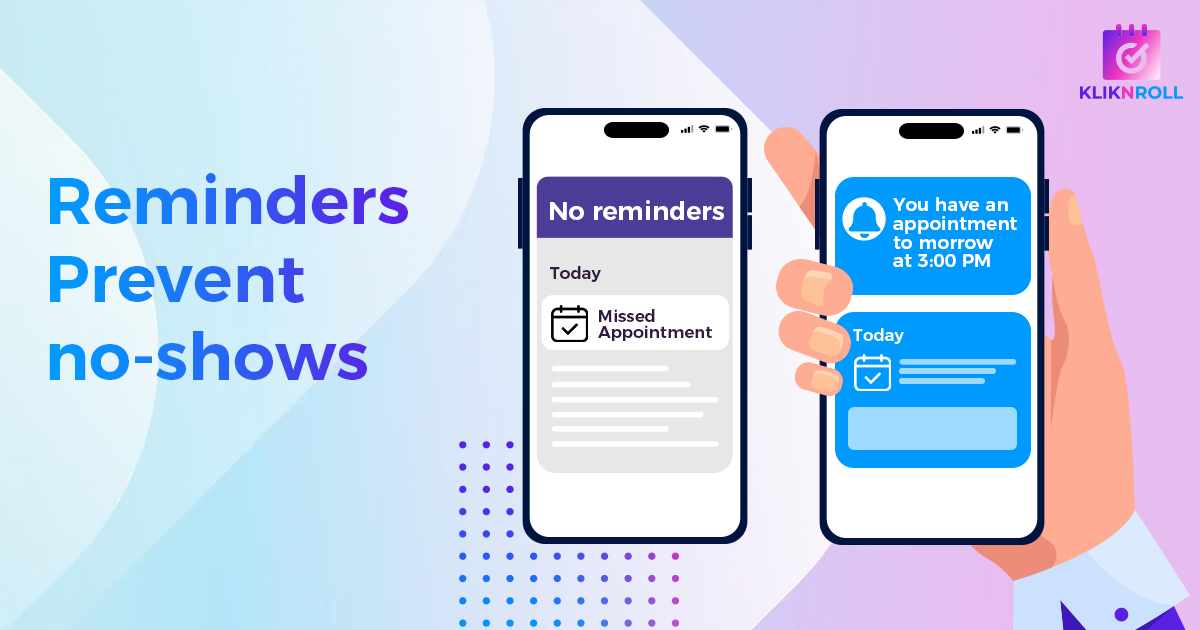
A surprisingly common booking mistake is assuming that once someone books, they’ll show up. In reality, life gets busy, and people forget, unless you remind them.
No-shows cost you time, disrupt your schedule, and bleed revenue. This is especially painful for small businesses where every appointment counts.
Most booking systems today offer automated confirmations and reminders, yet many businesses fail to enable them. This booking mistake is not only avoidable but expensive.
Customers expect a confirmation instantly after booking. If they don’t get one, they may not even be sure the booking went through. And if they don’t receive a reminder the day before, the risk of them forgetting increases dramatically.
The fix is simple: automate it. A proper booking confirmation system, paired with timely reminders, reduces no-shows and builds trust through professionalism.
Using Disconnected Tools That Waste Time and Cause Errors
Another overlooked booking mistake is running your system across different tools that don’t sync. Maybe your website takes online bookings, but your front desk uses a spreadsheet. Or your mobile app isn’t connected to your staff’s calendar.
This leads to:
- Scheduling overlaps
- Miscommunication with customers
- Staff confusion over who’s coming when
When your systems don’t talk to each other, the whole booking process becomes fragile. One manual error can lead to a chain of missed or duplicated bookings.
Avoiding this booking mistake means consolidating everything into a central system, one dashboard where availability, staff calendars, and customer bookings all align in real time.
A Frustrating Booking Experience That Drives Customers Away
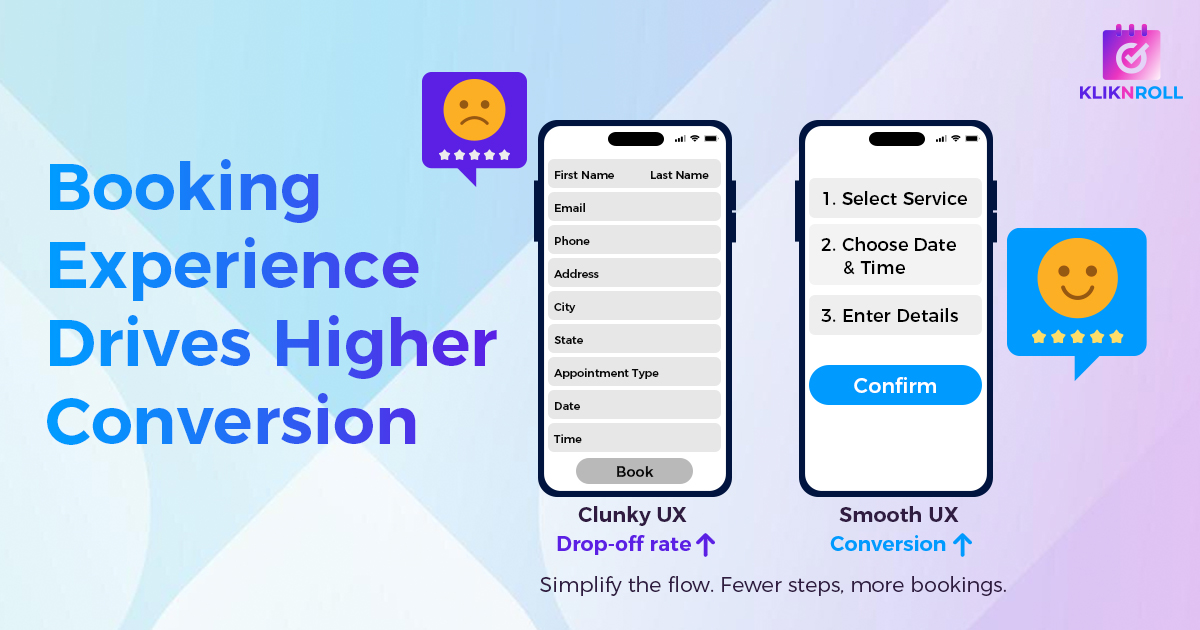
If your booking journey is confusing, slow, or too long, you’re creating friction that customers won’t tolerate. And yet, this is a booking mistake many businesses don’t even realize they’re making.
Ask yourself:
- Is the “Book Now” button clearly visible?
- Can a customer complete the booking in under 60 seconds?
- Is the form mobile-friendly and easy to navigate?
If the answer to any of these is no, chances are your booking flow is pushing customers away before they even finish.
This is a silent booking mistake, because you don’t see the customers who abandon mid-way. But they’re leaving, and probably going to your competitor.
Improving your UX is key. Every unnecessary field, every unclear step, adds to drop-off risk. Think like a customer and test your own process. The fewer the clicks, the higher the conversion.
Booking Systems That Don’t Work on Mobile
Most bookings now happen on mobile. If your system isn’t optimized for small screens, you’re making a critical booking mistake, ignoring the primary platform your customers use.
Here’s what bad mobile booking looks like:
- Forms that require zooming in and out
- Buttons that are hard to tap
- Pages that don’t load properly
These mobile issues lead to abandoned bookings and lost opportunities. They also make your business appear outdated.
Fixing this booking mistake means adopting a mobile-first design approach. Ensure everything, from choosing a slot to confirmation, is seamless on any screen. This isn’t optional anymore; it’s expected.
Time Zone Confusion for Virtual Appointments
For businesses with clients across different cities or countries, another serious booking mistake is failing to clarify time zones.
If your system books sessions based on your local time, but doesn’t show this clearly to the client, it’s only a matter of time before someone misses their appointment.
Virtual service providers, online consultants, and remote teams are especially vulnerable to this issue. And the fallout is more than just an empty time slot. It’s a frustrated client who feels like their time wasn’t respected.
Avoid this booking mistake by using systems that automatically adjust to the client’s local time zone and state the time zone clearly in confirmation messages.
Delayed Confirmation, or No Confirmation at All
In a world of instant everything, making a customer wait for booking confirmation is another preventable booking mistake. When someone books, they expect to know right away that their request went through.
If your process involves “We’ll get back to you” or “Someone will call to confirm,” you’re creating uncertainty, and people hate that.
This often happens in businesses still relying on manual approvals or outdated systems.
Fixing this booking mistake is easy: implement automated confirmations. These not only reassure the customer but also reduce your admin load. Some systems also let customers manage or reschedule their own appointments, a win-win for both sides.
No Analytics or Data to Improve Booking Performance
Perhaps the most strategic booking mistake is not measuring how your system performs. If you’re not tracking no-show rates, drop-off points, or peak hours, you’re flying blind.
Without booking data, you can’t improve. You won’t know:
- What percentage of visitors complete the booking
- Which services are most in demand
- Where your bottlenecks are
Smart booking systems provide this insight, and businesses that act on it see better retention, more efficient staff allocation, and higher revenue.
Making data-driven decisions helps eliminate repeated booking mistakes, spot trends, and align your capacity with actual demand.
No Integration With Your Other Business Systems
One last critical booking mistake is isolating your booking system from the rest of your business tools. If it doesn’t talk to your CRM, payment platform, or email system, you’re missing out on automation and valuable touchpoints.
The consequences? You’re manually entering client info into multiple systems. You forget to follow up. You lose chances to upsell, cross-sell, or rebook.
A properly integrated booking system allows:
- Automated client record creation
- Triggered emails based on booking behavior
- Seamless payment and invoicing flows
Integration transforms your bookings from isolated transactions into long-term relationships. Skipping this step is a booking mistake that limits your growth.
Final Thoughts: Booking Mistakes Aren’t Small, They’re Business Risks
In 2025, the standard for booking experiences is higher than ever, and customers won’t hesitate to switch to businesses that offer smoother, more reliable options.
A single booking mistake can undo all your marketing, damage your reputation, and turn loyal customers away. But the good news is, these mistakes are fixable. With the right system in place, you can prevent scheduling errors, reduce no-shows, and simplify the customer journey.
If you’re still relying on manual tools or disconnected systems, it’s time to upgrade.
KlikNRoll, an online booking system, is built to help modern businesses avoid costly booking mistakes. With features like real-time syncing, automated reminders, mobile optimization, and full visibility across your team, KlikNRoll gives you everything you need to keep your schedule, and your customer experience, running smoothly.
Make 2025 the year you stop losing business to preventable mistakes. Switch to KlikNRoll today.

Hey there! I’m Jeffrey Hau, and my journey in the digital world started after I wrapped up my psychology degree at UCLA. Imagine coming back to the bustling streets of Hong Kong from the tech haven of Silicon Valley – it was a whirlwind of inspiration! Seeing how social media platforms were evolving at breakneck speed and realizing the limitations of traditional advertising in this digital age, I decided to dive in.
In 2012, I laid the foundation of Prizm Group. From our humble beginnings, we’ve now blossomed into a global powerhouse with a team of over 200 passionate professionals. Our HQ is right here in Hong Kong, and we’ve spread our wings to SG, AU, NZ, JP, and China.
As a digital problem solver, our team found that several industries are in need of reservation systems, especially for F&B, Hotels, Beauty, and Medical sectors. Our digital magicians started crafting reservation systems tailored to cater to these specific needs. We extended our expertise to e-commerce, voucher management systems, and campaign management systems, combining them into KlikNRoll – an all-in-one solution. We deep dive into various industries, understanding their unique challenges and developing innovative solutions.
We’re not just a company; we’re your dedicated partners in transforming how you navigate the digital landscape. Our passion lies in providing businesses with intuitive and tailored solutions using KlikNRoll’s powerful capabilities.
Ready to embark on this exciting digital adventure with us? Let’s make your brand stand out in the digital jungle!



